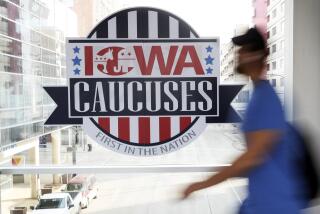Stumping--Not Market Crash--Rallies Iowans : 4-Legged Stock More of a Concern to Farmers Wooed by Presidential Hopefuls
- Share via
POSTVILLE, Iowa — Postville is pretty much a long way from everywhere, except maybe Waukon and Decorah, and even folks in Iowa will tell you that’s not saying a whole lot.
So the small crowd waiting Wednesday afternoon at Meyer’s 66 Cafe for Dick Gephardt to make a campaign appearance wasn’t very surprised when Gephardt’s advance man announced that the Democratic presidential candidate was running late. Everybody here knows how hard it is to get to Postville. After all, the interstate is 100 miles away.
Besides, with the harvest already in, nobody was in much of a hurry. Now, they just had a little more time to sit with their coffee and chat among themselves about the state of the world, or at least the state of Postville, population 1,500.
One thing they weren’t talking about with much concern, though, was the stock market crash.
“If you walk into the bank here and start talking about stock, you better have four legs, because that’s the only kind of stock they know about around here,” says retiree Don Colvin, who used to invest. “Most of our stock is out running in the field,” Leo Jahnke, a city councilman, adds.
Postville, you see, like so many other small farming towns in the Midwest, is even further removed psychologically from Wall Street than it is geographically. Few people around town own stock, and those that do are pretty closed-mouthed about it. In a plain little hamlet that is just emerging from the wrenching farm crisis, the fortunate, the area’s handful of land-rich farmers and affluent professionals, don’t brag.
“There’s very little talk about it, because very few fiddle with it,” says Robert Gruhn, a stone-faced semi-retired farmer. “The veterinarian’s wife, now she made good money at it, but I don’t know how she’s doing now.
“I thought about buying a little stock awhile back,” he slowly reveals. “But you got to go get a broker and everything, and it was just too much trouble.” It turns out there is no Dow Jones ticker tape in Postville, and the closest brokerage is about 50 miles away in Waterloo.
“I don’t believe many invest,” adds Postville Mayor James Ewing. “I just wonder if they have that kind of money.”
But of course, the main reason Postville isn’t thinking about Wall Street’s problems is that people here already have plenty on their minds as it is. The five-year farm crisis that is just ending has left them dazed and confused about their future.
At the same time, many here are now concentrating on the presidential race that is already in full gear across Iowa, home to next February’s first contest in the 1988 campaign. And frankly, they are looking hard to find a candidate who will help Iowa, not those New York financiers who never showed much sympathy for the Midwest’s troubles earlier in the decade. That’s why they came to listen to Gephardt, a Missouri congressman who has the backing of militant farm groups in Iowa because of his support for radical legislation designed to save the family farm.
“These people on Wall Street, they’re no different from farmers who borrowed money to pay $3,000 an acre for land back in the 1970s,” says Gruhn. “They just got greedy, and they got stupid.”
Adds Edith Clesi: “One thing, people are glad to see these yuppies get their comeuppance.”
But that doesn’t mean Postville isn’t worried about the economy, and what the stock market crash could portend for Iowa down the road. “What we’re wondering is, when is it going to hit us, when is it going to start to affect regular people,” notes Clesi. “This is a dairy area, and a hog-raising area. I want to know what is this going to do to hog and beef prices, to milk prices.”
Indeed, while few here have monitored the Dow Jones industrial average in recent days, there have been plenty of sophisticated, Postville area farmers checking out their home computers or their quote machines to see how agricultural commodity futures prices have reacted to the collapse in the equities markets.
“I was out in the field . . . when I heard the market fell 500 points, but I didn’t pay much attention,” says Pat McNally, who grows hay and raises hogs and cattle with his father on a 350-acre family farm. “But I went in and looked at ‘Pro-Farmer’ (a commodity news service) to see how the commodities markets were doing.” To his dismay, he has found hog futures down the limit in recent trading sessions.
“People follow the commodity markets a lot more than stocks, because that’s what they are involved in,” observes McNally. “Out here, you can see commodities, you can see whether people are raising more hogs, or are participating in federal programs, so you feel like you know something about the commodity markets.”
In fact, McNally’s father used to speculate in futures; with so many grain and livestock brokers in the area capable of making futures trades, it’s easier to invest in commodities in Postville than in stocks.
“People here know more about hogs than they do about General Motors or General Electric,” adds Jahnke.
Finally, Gephardt sped into town in his campaign van, and Meyer’s 66 Cafe settled down to listen to the candidate’s stump speech, in which he mentioned the stock market once, agriculture many times.
“We’ve got mountains of corn going to rot in this state . . . I’m not satisfied that we’ve got farmers working hard and getting nothing for it,” Gephardt said to appreciative applause.
“I’d be happy to take your questions,” he added.
There was not a single one about Wall Street.
More to Read
Sign up for Essential California
The most important California stories and recommendations in your inbox every morning.
You may occasionally receive promotional content from the Los Angeles Times.










